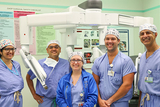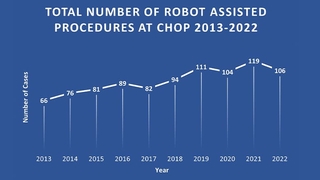
Minimally invasive surgery (MIS) allows surgeons to treat various urologic disease processes involving the kidneys, bladder, urinary tract and reproductive organs via smaller incisions with less postoperative pain, faster recovery, shorter hospitalizations and better cosmesis than traditional “open” surgery. Led by Aseem R. Shukla, MD, MCHI, Director of Minimally Invasive Urologic Surgery at Children’s Hospital of Philadelphia (CHOP), and joined by a team of experienced world-class MIS surgeons, our team has performed thousands of pure laparoscopic, and more than 1,200 robot-assisted urologic procedures over the past decade alone. This volume makes CHOP one of the most experienced pediatric urology MIS programs in the world.
Surgeons at CHOP have been leading in minimally invasive robotic surgery since the robot was introduced at CHOP in 2006. Over the years, our team was at the forefront of advances in robotic urologic surgery, prioritizing safety and surgical success, while exploring the limits of MIS technology to innovate and implement novel and durable reconstructive techniques into our practice to benefit children in our care.

Our group was an early proponent in the movement to champion the lower tract approach to caring for kidney duplication anomalies, publishing the largest series examining the role of robot-assisted uretero-ureterostomy for ectopic ureters and ureterocele. We also published extensively on the safety and indications for the robot-assisted ureteral reimplantation, infant (as young as 2 months of age) robotic pyeloplasty, and robot-assisted ureterocalicostomy after previous failed pyeloplasty. Despite taking on many challenging cases our robot-assisted surgery outcomes remain excellent with published success rates that meet or exceed national benchmarks for those procedures.
We continued our innovative approach to robotic surgery by expanding our scope of practice to include complex deep pelvic reconstructions including dismembered ureteral reimplant with tapering and appendicovesicostomy among other procedures. Recently, we introduced intracorporeal bladder augmentation with and without bladder neck reconstruction for the care of children with neurogenic bladder.

The pediatric urologic surgeons at CHOP are also experts in advanced pure, non-robot assisted laparoscopic techniques and procedures. Historically, the success rate for laparoscopic orchiopexy is 80% to 90%. A recent internal review of our patients showed the success rate for laparoscopic orchiopexy at CHOP is 98%. CHOP is also one of a few centers across the country offering single site laparoscopic surgery (a single incision hidden within the umbilicus). Single site laparoscopy is commonly used for orchiopexy, nephrectomy, inguinal hernia repair and gonadectomy at CHOP, making our team a comprehensive minimally invasive surgery practice for any patient.

To facilitate the continued growth of our program, CHOP acquired the newest robot-assisted surgical platform released by Intuitive Surgical® and continues to adapt the latest technological breakthroughs for the care of children. Through our constant desire to improve patient care, develop new treatment options, and improve outcomes, we have built a leading robot-assisted and laparoscopic surgery practice that is benefiting children across the country and around the world.
After you read this newsletter we hope you will visit our website, or reach out to us directly at 215-590-2754, so our team can answer any questions you might have as to the potential role of MIS for the children in your care. We are grateful that you are interested in learning more about MIS in Urology at CHOP.
Featured in this article
Specialties & Programs
Minimally invasive surgery (MIS) allows surgeons to treat various urologic disease processes involving the kidneys, bladder, urinary tract and reproductive organs via smaller incisions with less postoperative pain, faster recovery, shorter hospitalizations and better cosmesis than traditional “open” surgery. Led by Aseem R. Shukla, MD, MCHI, Director of Minimally Invasive Urologic Surgery at Children’s Hospital of Philadelphia (CHOP), and joined by a team of experienced world-class MIS surgeons, our team has performed thousands of pure laparoscopic, and more than 1,200 robot-assisted urologic procedures over the past decade alone. This volume makes CHOP one of the most experienced pediatric urology MIS programs in the world.
Surgeons at CHOP have been leading in minimally invasive robotic surgery since the robot was introduced at CHOP in 2006. Over the years, our team was at the forefront of advances in robotic urologic surgery, prioritizing safety and surgical success, while exploring the limits of MIS technology to innovate and implement novel and durable reconstructive techniques into our practice to benefit children in our care.

Our group was an early proponent in the movement to champion the lower tract approach to caring for kidney duplication anomalies, publishing the largest series examining the role of robot-assisted uretero-ureterostomy for ectopic ureters and ureterocele. We also published extensively on the safety and indications for the robot-assisted ureteral reimplantation, infant (as young as 2 months of age) robotic pyeloplasty, and robot-assisted ureterocalicostomy after previous failed pyeloplasty. Despite taking on many challenging cases our robot-assisted surgery outcomes remain excellent with published success rates that meet or exceed national benchmarks for those procedures.
We continued our innovative approach to robotic surgery by expanding our scope of practice to include complex deep pelvic reconstructions including dismembered ureteral reimplant with tapering and appendicovesicostomy among other procedures. Recently, we introduced intracorporeal bladder augmentation with and without bladder neck reconstruction for the care of children with neurogenic bladder.

The pediatric urologic surgeons at CHOP are also experts in advanced pure, non-robot assisted laparoscopic techniques and procedures. Historically, the success rate for laparoscopic orchiopexy is 80% to 90%. A recent internal review of our patients showed the success rate for laparoscopic orchiopexy at CHOP is 98%. CHOP is also one of a few centers across the country offering single site laparoscopic surgery (a single incision hidden within the umbilicus). Single site laparoscopy is commonly used for orchiopexy, nephrectomy, inguinal hernia repair and gonadectomy at CHOP, making our team a comprehensive minimally invasive surgery practice for any patient.

To facilitate the continued growth of our program, CHOP acquired the newest robot-assisted surgical platform released by Intuitive Surgical® and continues to adapt the latest technological breakthroughs for the care of children. Through our constant desire to improve patient care, develop new treatment options, and improve outcomes, we have built a leading robot-assisted and laparoscopic surgery practice that is benefiting children across the country and around the world.
After you read this newsletter we hope you will visit our website, or reach out to us directly at 215-590-2754, so our team can answer any questions you might have as to the potential role of MIS for the children in your care. We are grateful that you are interested in learning more about MIS in Urology at CHOP.
Contact us
Division of Urology